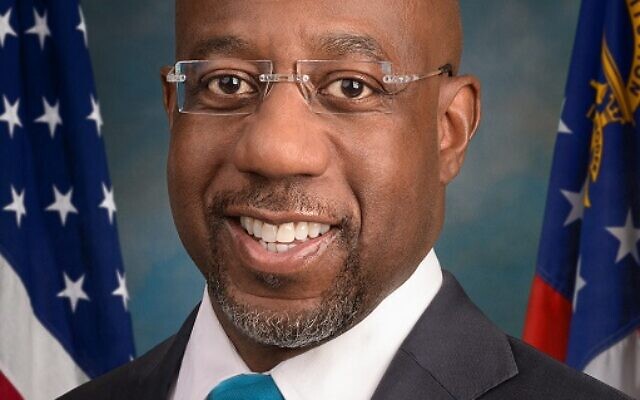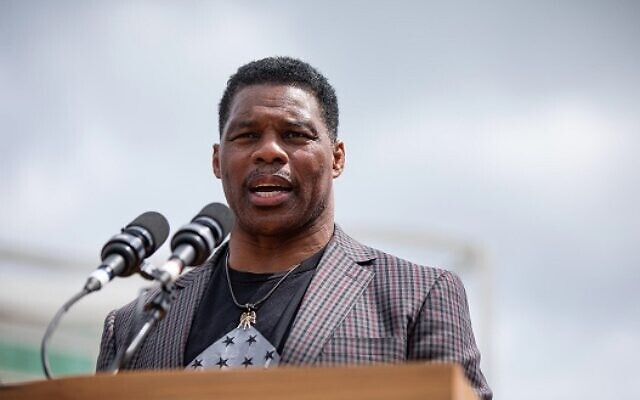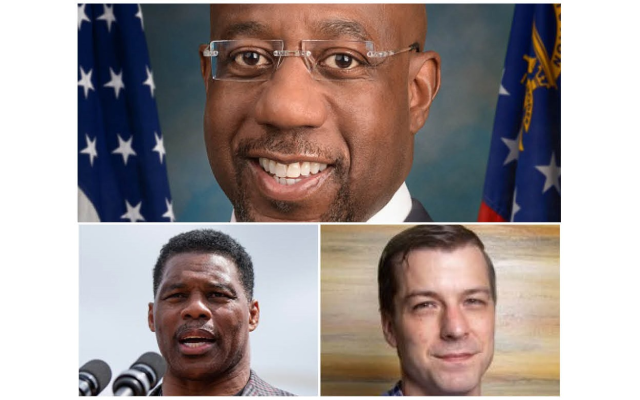Senate Race Gets Personal
The contest featuring Raphael Warnock and Herschel Walker has focused as much on character as policy.
Dave Schechter is a veteran journalist whose career includes writing and producing reports from Israel and elsewhere in the Middle East.
In the 246-year-history of the United States of America, just 11 African Americans have served in the U.S. Senate.
The most recently elected was Georgia Democrat Raphael Warnock, winner of a Jan. 5, 2021, runoff against appointed Republican Sen. Kelley Loeffler. Warnock was elected to serve the final two years in the term of the late Republican Sen. Johnny Isakson, who stepped down in December 2019 because of ill health.
Warnock, who has maintained his position as senior pastor of Ebenezer Baptist Church in Atlanta, is seeking a full six-year term in the Senate. His chief opponent is Republican Herschel Walker, also an African American, best known to many Georgians as the Heisman Trophy-winning running back on the University of Georgia football teams of the early 1980s.

Georgia may determine — again — which party controls the Senate. Following the election of Warnock and fellow Georgia Democrat Jon Ossoff (who defeated incumbent Republican Sen. Davie Perdue in a runoff), the Senate was divided 50-50, with Democratic Vice President Kamala Harris holding the tie-breaking vote.
The race could hinge on votes received by Libertarian candidate Chase Oliver. Georgia law requires that the winner receive a majority of the votes cast. Polls conducted during October showed Warnock leading, but most were within the survey’s margin of error, and only one out of eight gave him more than 50 percent. A runoff would be held Dec. 6.
Walker has been a vocal supporter of former President Donald Trump, who owned the New Jersey Generals of the now defunct (1983-85) United States Football League and signed the UGA star, then in his junior year, to a contract in 1984.
Throughout the campaign, questions have been raised about the veracity of statements made by Walker, including details of his business ventures and resume.

Supporters of both candidates have pointed to personal controversies of the other, whether it be Walker’s mental health issues, threats against women, and abortion-related allegations, or Warnock’s divorce and rental housing owned by the church.
Walker’s campaign has sought to tie Warnock to what Republicans view as failed policies of the Biden administration. According to the website
FiveThirtyEight.Com, through August, 96 percent of the votes cast by Warnock were aligned with positions taken by the Biden administration.
Speaking in August to the Atlanta chapter of the Republican Jewish Coalition, Walker expressed opposition to any revival of the 2015 Iran nuclear deal, from which Trump withdrew the United States in 2018. He criticized Warnock for not speaking out against the Iran deal. “That’s what I don’t get. You’re going to give money to terrorists to be nice to you? He never read the definition of a terrorist, has he? They don’t like you. They like nothing about you,” Walker said.

Also at that event, Walker criticized the Inflation Reduction Act passed by Democrats in Congress, particularly provisions dealing with climate change. Walker reportedly told the audience that “a lot of the money goes to trees,” adding, “Don’t we have enough trees around here?”
Noting the large number of Jewish recipients of Nobel Prizes, Walker told the RJC gathering, “God’s people do big things.”
Warnock has long-standing ties to Atlanta’s Jewish community, including through joint services and social justice projects in conjunction with The Temple. Speaking in October at a gathering sponsored by three Jewish groups, he preached on such issues as defending democracy and voting rights, protecting abortion rights, expanding health care access and affordability, and investing in infrastructure.
The senator did not mention Israel until he spoke with reporters after the event. When the AJT asked about his omission of a subject that usually receives at least passing attention when candidates appeal to Jewish groups, Warnock said: “My commitment to Israel, its right to exist, and the importance of having a strong and secure Israel that is at peace with its neighbors, is well established. A lot of the people in this audience have worked with me on that issue, and I look forward to continuing to work with them on this issue.”
According to the most recently available data from the Federal Election Commission, Warnock had raised $111.3 million since December 2020 (the most by any candidate for federal office this campaign cycle), spent $120.2 million in that period, and had $13.8 million cash on hand. Walker had raised $31.8 million since March 2021, spent $24.5 million in that period, and had $7.3 million cash on hand. Oliver reported raising $7,700, spending $2,600, and had $345 cash available.
- voters guide
- politics
- Dave Schechter
- U.S. Senate
- Raphael Warnock
- Kelley Loeffler
- Johnny Isakson
- Ebenezer Baptist Church
- Herschel Walker
- Heisman Trophy
- University of Georgia
- Jon Ossoff
- Vice President Kamala Harris
- Davie Perdue
- Chase Oliver
- Donald Trump
- New Jersey Generals
- United States Football League
- FiveThirtyEight.Com
- Republican Jewish Coalition
- Inflation Reduction Act
- Nobel Prize
- The Temple
- Federal Election Commission
- Iran Deal




comments